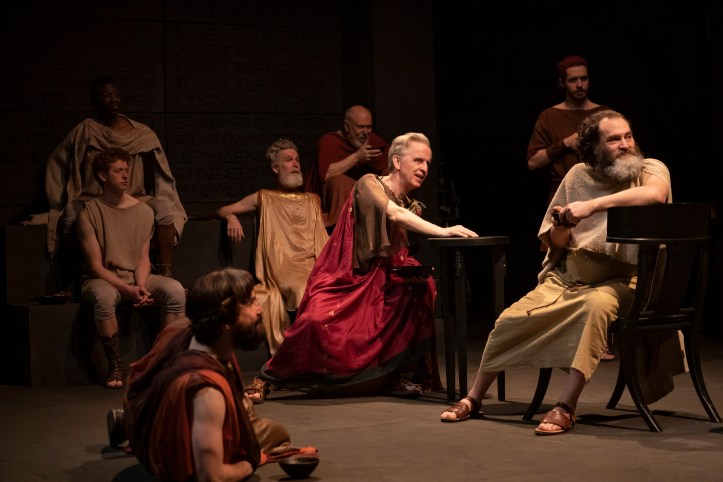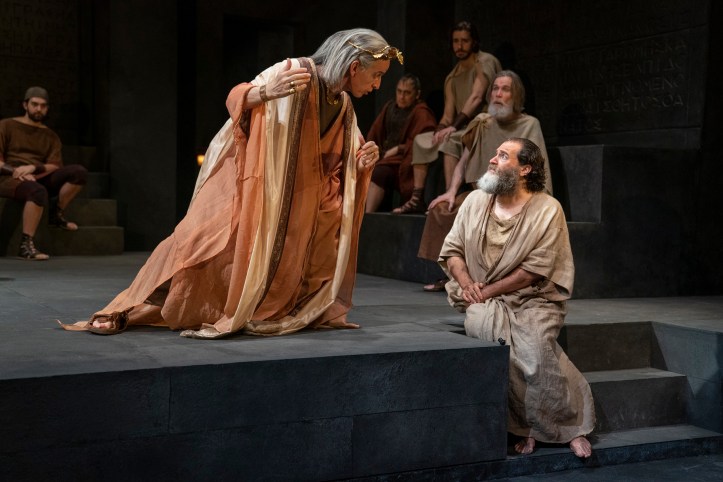
The Review: The Public Theater’s Socrates
By Ross
Written with wit and wiseness by the wildly talented Tim Blake Nelson (Eye of God, The Grey Zone), the Public Theater’s production of Socrates has a number of things on its mind. It’s the perfect centerpiece for the Onassis Festival at the Public, as the program is focused around democracy, and who is better to start a debate than Socrates. This play is about democracy with vengeance, one says, where the mob rules, paralleling the complicated place we find ourselves in this very day. This Athenian time is tyranny disguised as democracy, where the approximation of truth is clearly something else, like a shadow thrown against the wall. When a man is sentenced to death for questioning the very institution he’s responding to. Truth appears to be one thing, but distortion has created another. That is true of our current political situation, and it’s definitely what Socrates, the heroic intelligence that embodies the center of this passionate affair, is out to understand and pick apart, for the good of all humanity, and to the annoyance of many on the streets of Athens.

As directed with clarity and strong articulate vision by the talented Doug Hughes (Broadway’s Junk, The Father), Socrates, played with weight and wit by the phenomenal Michael Stuhlbarg (Broadway’s The Pillow Man) does his work with the wiseness of words, circling around his audience with speeches that perplex and embarrass the powerful, while annoying the working man. We are lead into this journey by Plato, played with strength and solidness by Teagle F. Bougere (Vineyard Theatre’s Beast in the Jungle) as he instructs a boy (Niall Cunningham) about the ugly and beautiful streets of the city explaining how Socrates, the great philosopher, questioning the very institution he embraced, democracy, found death within his hemlock’d folly. It’s a tragic tale told with thought and study, wrapped in an easy edge by his disciple, Plato. Socrates didn’t leave any writings behind, hating that his words would be misconstrued, but thankful for us, Plato did that dastardly deed, and then Nelson, and together they gave us a Socrates to remember.

The greatest thinker of his time, killed by those who called him a traitor. “Why did they do that?“, the young boy asks his teacher, the wise Plato. And what unfolds before us, through reverence and weighted glee to the tune of nearly three hours, is a strongly written and endearingly pure piece of theatre with a lightness of touch and a swagger in his bare-footed stance. To understand Socrates in his essence is to consider how Plato, within his writings of the man, presents him as a teacher, even while Socrates discarded that title with every possible breath. When Alcibiades, played muscularly and passionately by the engaging Austin Smith (Broadway’s Hamilton) captivates us all by giving something of a pre-death eulogy (little did he know at the time…), we see Socrates as the honored learned man of his time. The handsome Athenian general chronicles with a never ending charm how he tried his best to seduce Socrates time and time again, utilizing his impressive physique as something akin to payment for learning. The attempted ‘corruption’ failed, as history does show, as Socrates’ interests in Alcibiades proved to be entirely of the soul rather than the body, but the relationship between the two, as deemed by Plato, is seen as something important. The soldier’s name appears more frequently in Plato’s recordings of dialogues more than any other, and it’s no wonder, as that opening cements the tone and obsessional stance of this Socrates. The scenario is rich and dripping in clever twists and turns, exemplifying all that is good and strong in Nelson’s Athens.

The man is decidedly difficult, to say it lightly, reminding me of all those ‘know-it-all’ characters that I try to avoid at a cocktail party. They live to question, and debate, while never claiming to be wise. Socrates is of that sort. A complete pain to be around sometimes, even within this play, but also someone to respect, as Nelson would have it. This Socrates lives in a more intellectual place of scrutiny, attacking an issue with “just a few questions” in order to find the flaw in thinking. He does that with the powerful politician, the esteemed artist, and the hard working craftsmen. Much to their dislike. His wife, Xanthippe, dynamically portrayed by Miriam A. Hyman (Public’s Richard III), knows it all too well, this tendency within his interactions: “I know you won’t extol my virtues as a husband and father,” Socrates states, “given the berating that goes on under my roof on a daily basis.” “A daily basis?” she wickedly replies with surprise, “You’re home every day??” Touché.

The production is filled to the brim with a cast of pros; David Aaron Baker, Ro Boddie, Peter Jay Fernandez, Karl Green, , Robert Joy, Alan Mendez, Tom Nelis, Dave Quay, Daniel Reece, Joe Tapper, and Lee Wilkof, fill out the space with clarity and purpose, embodying the Athenians of all status levels by wondrously reacting and receiving with authority and subservience. But it is in the Socrates discipline, that the man finds himself charged as a traitor, and in the complicated position of being judged by a jury randomly picked from the masses. “More wished him dead then found him guilty“, a shockingly wise condemning of the man and the system, of counterintuitive crimes against the democratic state. Uncomfortably perfect, through the epic work of scenic Scott Pask (Broadway’s Mean Girls), with solid obvious costuming by Catherine Zuber (Broadway’s My Fair Lady), strong lighting by Tyler Micoleau (Public’s Miss You Like Hell), and a clear sound design and original music by Mark Bennett (Public’s The Low Road), we, the audience, somehow find ourselves to be part of the jury. Being addressed to as if it is up to us to decide Socrates’ fate. Within that construct, the direct attention given by Socrates during his trial enlivens the piece that sometimes gets weighed down by lengthy challenges to all the levels of democracy. It’s the fire that is needed to pull us to the end, and a welcomed one at that, as the edge that held us glued to our seats was starting to shift to discomfort rather than enlightened excitement. Thankful, Stuhlbarg’s thoughtful embodiment of the philosopher and the dynamic staging pulls us back in, dragging us from passive observer to active participant and member of the democratic jury. It’s a wise shift, and one that makes this Socrates alive and engaging, even when he is maddeningly annoying in his process of questioning. We could all use a bit of that now.

[…] The Public’s Socrates Speechifies with Challenged Splendor May 13, 2019 […]
LikeLike
[…] Agrippa, performed with power and authority by Teagle F. Bougere (Public’s Socrates), tries his best to give forth an alternative in an attempt to break through, but to no avail. […]
LikeLike
[…] He tries to chant the quiet young Disciple, powerfully portrayed by Karl Green (Public’s Socrates) and his caring sister, tenderly played by Adrianna Mitchell (Two River’s Noises Off), away, […]
LikeLike
[…] So does Dun, the school’s security guard, forcibly portrayed by Ro Boddie (Public’s Socrates), who matches her fire and her fight, but from a different vantage point. Their chemistry is a […]
LikeLike
[…] anger clouds the horizon. That is until Henry, stoically portrayed by Austin Smith (Public’s Socrates) walks in carrying food and drink, throwing a curveball that some saw coming, and others did not. […]
LikeLike
[…] Boris Berezovsky, played to the max by Michael Stuhlbarg (“A Serious Man“; Public’s Socrates), who basically became a King-maker, in the form of Vladimir Putin, played strongly by Will Keen […]
LikeLike